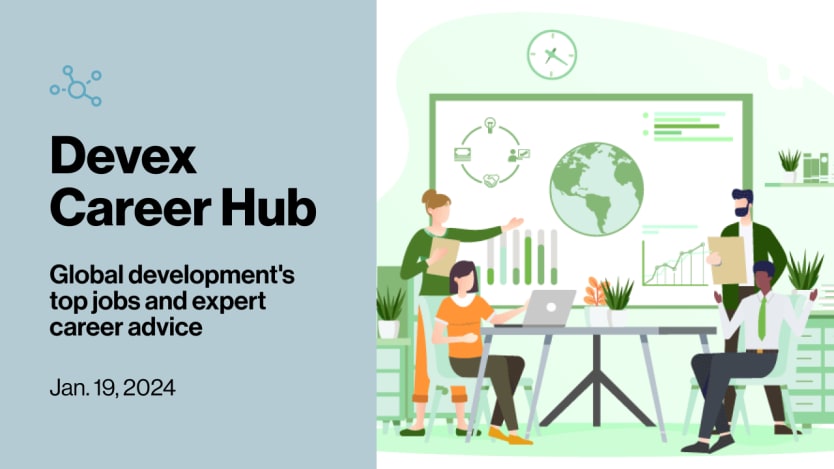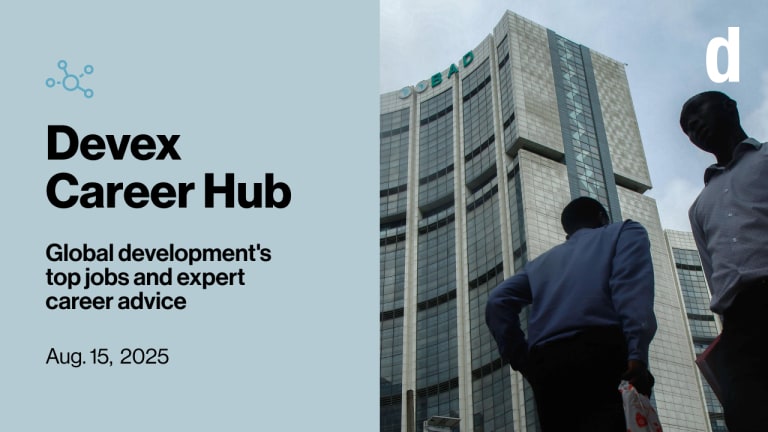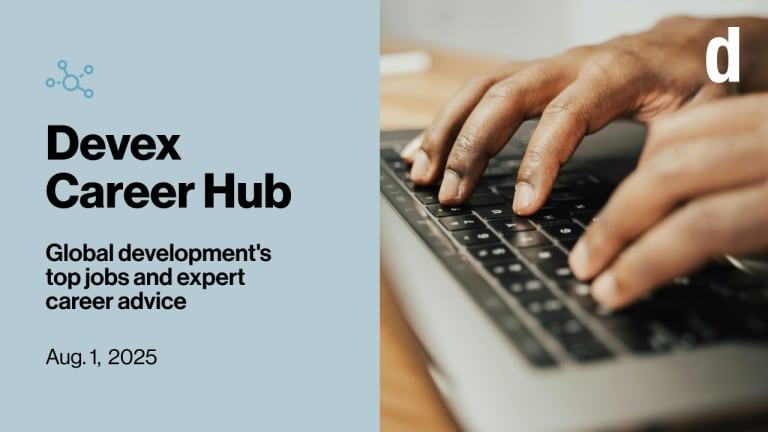Presented by Georgetown University

One of the many truths revealed about working in global development during our first digital careers event of the year, which took place earlier this week, was that every organization has its own challenges. We also learned that what staff might encounter working for a large, multilateral organization such as the World Bank will likely differ compared to a smaller NGO.
In this edition of Career Hub, I’m sharing key insights into some of the pros and cons of working for the latter, as revealed by our event’s expert panel of development professionals. Plus, featured job postings from the likes of the World Health Organization, Tetra Tech, and more.
+ Join us on Jan. 30: Looking to transition into global development? Expert career coaches will advise on what to consider before making the leap. If you're not yet a member, we’re offering a limited-time 50% discount on annual memberships, which open access to all career events and advice content, our complete job board, and much more.
Top jobs this week
1. Associate Director, Climate Diplomacy and Geopolitics
E3G
United States | United Kingdom
2. Senior Research Assistant (Data Management & Analysis)
World Health Organization
France
3. Head of Humanitarian Practice Network (HPN) Development and Partnerships
Humanitarian Practice Network
Worldwide
4. Content Coordinator – Indonesia
Tetra Tech
Indonesia
Devex Jobs Alert on LinkedIn: For many more of the top job opportunities in the social impact space from global development's largest job board, check out the weekly Devex Jobs Alert newsletter on LinkedIn.
Pros and cons: Working for small NGOs
“If you prove yourself alert, capable, willing to learn [and] listen well, you may find yourself with responsibilities you couldn’t have imagined just weeks or months before.”
— Bart Édes, professor of practice, McGill UniversityDuring our recent event, Socorro Torres-Duarte, who spent over two and a half years as the head of institutional fundraising and partnerships at the advocacy NGO Transparency International UK, said that working for a small NGO has “some challenges, but lots of pluses, too.” In her experience, they are “small but mighty.”
Torres-Duarte was joined by Bart Édes, a development professor of practice at McGill University, and other sector experts, who shared unfiltered perspectives on the many angles a development career can encompass, including the key differences between working for different types of organizations. Here are some key takeaways for those considering an NGO role.
➕ Pro: Strength in partnerships. Smaller NGOs are partnership-heavy, which “gives you an amazing advantage, because working in partnership exposes you to other people, to other networks,” establishing “new relationships, and that can help you define your next career move,” Torres-Duarte said.
➖Con: Flawed internal systems. Smaller NGOs “might not have the most seamless internal processes and systems,” and the need to build these “on the go … might [make it] feel [like] you're not really progressing or advancing on your objectives,” Torres-Duarte said.
➕ Pro: More room for impact. There tends to be less of an internal hierarchy within smaller organizations compared with development banks and multilateral employers, according to Édes, making it easier and faster to gain important skills than if you were to start out at a large organization.
➖ Con: Constant reliance on funding. “Seeing that the funding pots are being reduced quite substantially it’s quite discouraging,” said Torres-Duarte, referring to the steep cuts in aid funding from the U.K. government in recent years.
Watch: What it’s really like working in global development (Career)
Members-only jobs this week
1. Research & Operations Specialist
Global legal aid and advocacy organization
United States
2. Senior Risk and Research Officer
United Nations agency
United Kingdom
3. Finance Manager
Evangelical Christian organization
Worldwide
4. Assistant Protection Officer
United Nations agency
Democratic Republic of Congo
Origin story: An election win was just the start
As a social entrepreneur, lawyer, elected official, and SDG goalkeeper with the Bill & Melinda Gates Foundation, Jana Degrott has been on a mission to amplify the voices of underrepresented women in leadership.

The following has been edited for length and clarity.
I entered politics at the age of 21, mostly driven by the absence of representation for people of mixed race in my home country of Luxembourg. I was inspired by figures like Michelle Obama and wanted to foster positive representation in public leadership.
Initially, it was about gaining experience, but unexpectedly, I got elected. My seven years as councillor in Steinsel, Luxemburg, have been a roller coaster. As a trained lawyer, I have shifted my focus to social entrepreneurship, addressing barriers for young women and women of color. This prompted me to co-found We Belong Europe — to break stereotypes and create role models for future leaders.
We Belong showcases stories of women from minority groups and underrepresented backgrounds, emphasizing the importance of diverse leaders in the public and private sectors. We’re piloting a mental health support program for women and gender minorities in politics. The program addresses the disproportionately higher violence they face while ensuring their overall well-being. My own experiences in politics really highlighted the need for support structures within political parties.
Read more: Career advice from SDG advocate and We Belong co-founder Jana Degrott
Explore more on careers in gender equality: Experts provide insights for aspiring professionals to better understand the challenges, solutions, and areas of focus needed to achieve SDG 5.
Around the watercooler
News and views from around global development worth knowing about.
U.K. aid spending is finally rising. Following deep cuts that wrecked U.K. aid programs and brought international criticism, spending is now rising sharply at the Foreign, Commonwealth & Development Office, thanks to one of the most obscure committees within the government.
A long-held leadership vacancy is filled. Gavi, the Vaccine Alliance, finally named a new CEO: Sania Nishtar, a Pakistani lawmaker and doctor who became the country’s first female cardiologist and has a wealth of experience in health governance.
Bill Gates wants a COP for global health. Speaking at the World Economic Forum in Davos, the billionaire said he is "jealous" of the annual focus on climate change at the United Nations climate talks and believes progress on global health risks is sliding backward.

Sign up to Devex Career Hub for global development’s top jobs, expert career advice, and practical tips to help you do more good for more people.








